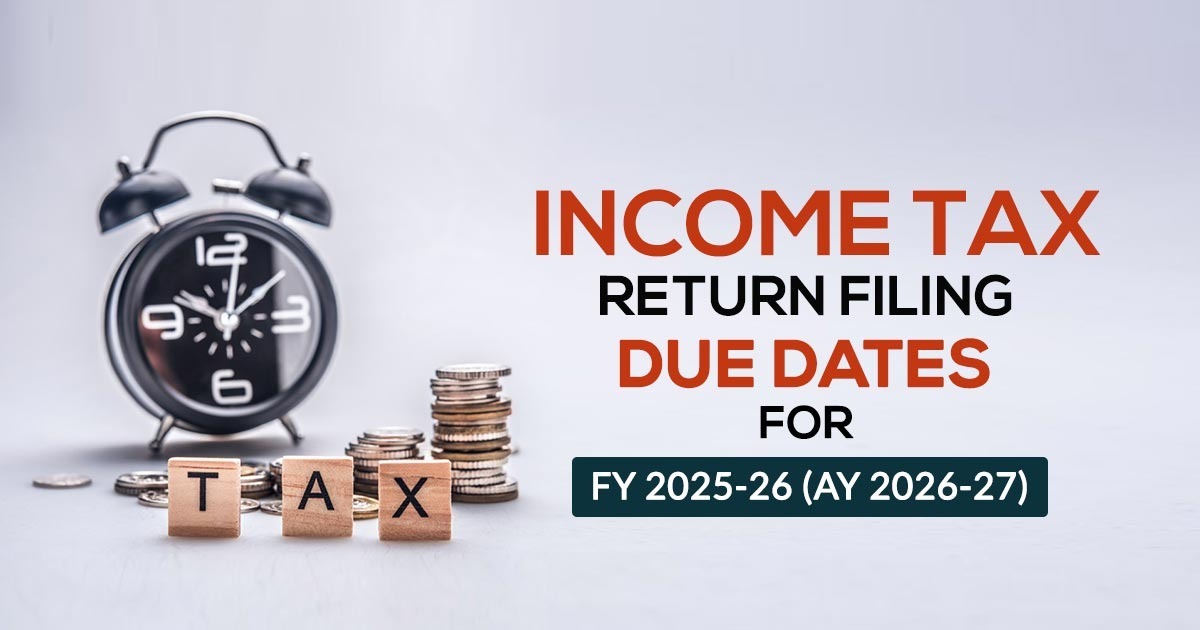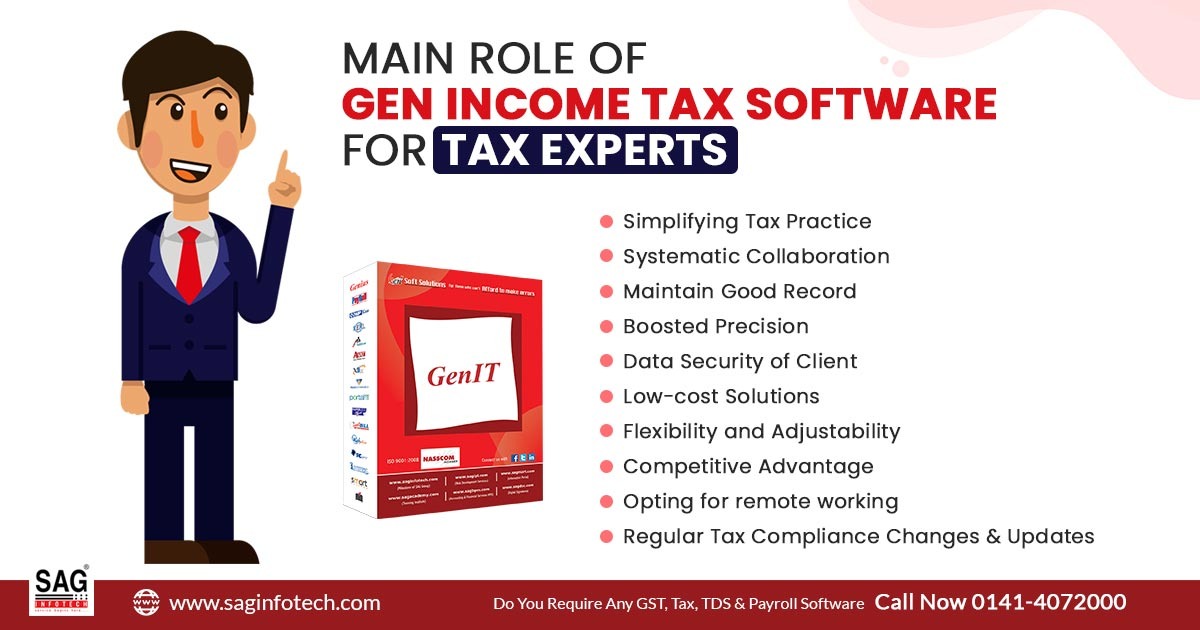
An Income Tax Return (ITR) is a form that is used to submit the information of your income and the relevant tax to the Income Tax Department of India. Indian income tax laws mention that every person and business earning an income should submit an Income tax return. It assists in depicting the taxable income, tax liability, and tax deduction claims, if any. The blog explores the latest Income Tax Return (ITR) filing due dates, ITR form applicability, and late fee penalties for FY 2025-26 (AY 2026-27), as per CBDT notifications.
Under the income tax rules and regulations, it is important to file taxes for every citizen of India. Whether you are an individual, an association or a firm, LLP, a local authority, or a Hindu undivided family, your income for each fiscal year is charged to tax as per the Income Tax laws. Therefore, filing the ITR yearly is crucial. At your convenience, you may choose to file an income tax return online or offline.
An Income Tax Return (ITR) is a form that an individual needs to submit to the Income Tax Department of India. The same secures the details of the income of the person and the tax that is required to be paid on it in the year. The data furnished in the ITR filing last date must be related to a specific fiscal year, i.e. starting on 1st April and ending on 31st March of the next year.
What does an Income Tax Return mean?
A person with the ITR form is required to submit it to the Income Tax Department of India. It comprises the details of the income of the person along with the due taxes on it in the year. It computes your net income tax obligation for a financial year. For the specific fiscal year between 1st April to 31st March of the subsequent year, the information furnished in an ITR must be applicable.
A person under 60 years of age should file tax returns if a part of their income is charged to tax, as per the Income Tax Act of 1961. If the taxable income is more than Rs 5 lakh in a fiscal year or you have filed an advance tax, then you would indeed be required to submit an ITR. While filing the ITR, you are required to pay your obligated taxes as per your applicable income tax slabs. The Income Tax Department has defined 7 types of ITR forms – ITR-1, ITR-2, ITR-3, ITR-4, ITR-5, ITR-6, and ITR-7, and the applicability of the form will be as per the nature and amount of income and the type of taxpayer.
What is E-filing of Income Tax?
An electronic submission of ITRs is called an e-filing of income tax. The same could be performed via the official website of the income tax department or validated third-party websites. Assessors can choose income tax e-filing. A PAN is important for tax return filing.
What Taxpayers Must Know About Filing Income Tax Returns
As per the Income Tax Act, the income tax would be required to be paid merely by individuals or businesses who come under the specific income slabs. Below are the entities or businesses that are mandated to file their ITRs in India:
- All individuals up to the age of 59 whose total income for a Fiscal year surpasses Rs 2.5 lakh. The limit for senior citizens (aged 60-79) would surge to Rs 3 lakh, and for the super senior citizens (aged 80 and above), the limit is Rs. 5 lakh. On using the income tax calculator, learn to input your gross income before applying deductions u/s 80C to 80U and exemptions u/s 10. Based on your total earnings, this ensures accurate tax calculations.
- All registered companies that generate income, irrespective of whether they have made any profit or not in the year.
- Those who claim a refund on the excess tax deducted/income tax they have submitted.
- Individuals who hold assets or financial interests in entities that are located outside India.
- Foreign companies that attain treaty advantages on transactions made in India.
- NRIs who earn more than Rs. 2.5 lakh in India in a fiscal year.
Income Tax Slab for FY 2025-26 (AY 2026-27)
| Tax Slab for FY 2024-25 | Tax Rate |
|---|---|
| Upto ₹ 3 lakh | Nil |
| ₹ 3 lakh – ₹7 lakh | 5% |
| ₹ 7 lakh – ₹ 10 lakh | 10% |
| ₹ 10 lakh – ₹ 12 lakh | 15% |
| ₹ 12 lakh – ₹ 15 lakh | 20% |
| More than 15 lakh | 30% |
New Income Tax Structure Slabs for FY 2024-25 (AY 2025-26)
Latest Update in Union Budget 2025-26: Updated income tax slabs 2025-26 post Budget 2025: Finance Minister Nirmala Sitharaman declared zero tax for individuals earning up to Rs 12 lakh in Budget 2025, with marginal relief for those who slightly exceed. Tax liability for incomes up to nearly Rs 12.75 lakh is minimized through calculated relief, ensuring fair treatment for higher earners.
| New Tax Slab for FY 2024-25 (AY 2025-26) | Tax Rate |
|---|---|
| Upto Rs. 4 Lakh | Nil |
| ₹ 4,00,001 To ₹ 8,00,000 | 5% |
| ₹ 8,00,001 To ₹ 12,00,000 | 10% |
| ₹12,00,001 To ₹16,00,000 | 15% |
| ₹ 16,00,001 – ₹ 20,00,000 | 20% |
| ₹ 20,00,001 – ₹ 24,00,000 | 25% |
| Above Rs. 24,00,000 | 30% |
Note:
- If your annual income is 12 lakh, you would typically need to pay 60,000 in taxes. However, due to a special benefit called a REBATE, you can reduce this tax amount completely, bringing your total tax payment down to zero.
- If you have a salary, you can benefit from an extra deduction of 75,000 rupees, which helps reduce your taxable income. This means that you won’t have to pay taxes on income up to 12.75 lakh rupees.
Read the official announcement for Income Tax by the Ministry of Finance: Click here
Types of (Income Tax Return) ITR Forms
For distinct categories of individuals and sources of income, there are 7 distinct sorts of ITR forms. As per the class of income generation, the Income Tax Department has different forms for each assessment. As per the Central Board of Direct Taxes in India, you should utilise the pertinent form to furnish your income tax. Below is the brief for the forms-
Income Tax is further subdivided into many categories, but there are three main categories of income tax based on the category of the payee and the time of payment.
These are:
- TDS (Tax Deducted at Source)
- Advance Tax
- Self-Assessment Tax
1. Tax Deducted at Source (TDS)
TDS, as it is commonly known, is Tax Deducted at Source. The tax is paid by a third person/corporation, who/which happens to be the source of income for the taxpayer, if the payment exceeds certain threshold limits at the rate prescribed by the government of India.
The other person/corporation must, however, abide by the prevalent IT laws. TDS is an ideal mechanism for the government to ensure timely Income Tax payment as well as curb tax evasion.
2. Advance Tax
Also referred to as the ‘pay as you earn Scheme’ in contrast to the scheduled annual tax payment tax procedures, Advance Tax is paid on a Presumptive basis.
Taxpayers, Businesses, Salaried Individuals, and freelancers with tax liabilities during the current financial year greater than Rs 10,000 need to pay advance tax in four instalments throughout the financial year in which they earn income.
“Fill in the Form to make a website for Tax Consultancy
Payment of Advance Tax Filing Due Dates for FY 2025-26
| Due Date | Pay Advance Tax |
|---|---|
| On or Before 15th June 2025 | 15% |
| On or Before 15th September2025 | 45% |
| On or Before 15th December 2025 | 75% |
| On or Before 15th March 2026 | 100% |
Note: The Assessee who are covered under section 58 (i.e. Presumptive Income) of the Income Tax Act, 2025, are also required to pay AdvanceTax on or before 15th March of the previous year. However, any tax paid till the 31st March will be treated as Advance Tax.
3. Self-Assessment Tax
This is the balance or remaining tax paid by an individual or taxpayer after taking into account the TDS and Advance Tax.
What is meant by Assessment Year and Financial Year?
Financial Year is the current working year in which an individual or corporation earns income. The Assessment Year is, on the other hand, the succeeding year in which an evaluation of the previous year’s income has to be made.
Assessment Year involves:
- Income Evaluation.
- Paying Taxes on the evaluated income as per the rate(progressive) and time ( regular or periodical, or occasional) notified by the IT Department.
- For FY 2024-25, the AY is 2025-26.
- The due Date for filing Income Tax Returns for FY 2024-25 (AY 2025-26) by the assessee whose accounts are not required to be audited is 31st July 2025.
- The due date for filing Income Tax Returns for FY 2024-25 (AY 2025-26) by assessees whose accounts are required to be audited is 31st October 2025.
- The due date for all the categories of assesses in UTs of J&K and Ladakh who are required to file ITR and accounts not required to be audited is 31st July 2025, while for those whose accounts are required to be audited is 31st October 2025.
- From Financial Year 2025-26 onwards, only “Tax Year” is referred to instead of Financial Year for tax purpose and Assessment Year is removed from income tax laws. Now financial year is called the tax year for all purposes under the new Income Tax Act, 2025.
Income Tax Returns (ITR)
ITR are forms that are mandatorily filled by individuals whose annual income is greater than a pre-set threshold limit set by the Finance Department. For distinct categories of individuals and sources of income, there are 7 distinct sorts of ITR forms. As per the class of income generation, the Income Tax Department has different forms for each assessment. As per the Central Board of Direct Taxes in India, you should utilize the pertinent form to furnish your income tax return.
In simple terms, ITR forms are taxpayers’ statements detailing/their earnings, Salary, interest, dividends, capital gains, or other profits, the total tax paid on earnings, and the appropriate refunds to be repaid to him/her by the Government. Below is the brief for the forms

ITR 1 or Sahaj
For individuals being a resident (other than not ordinarily resident) having total income upto Rs.50 lakh and having Income from Salaries, one house property, other sources (Interest etc.), long-term capital gains under section 112A up to Rs. 1.25 lakh, and agricultural income up to Rs.5 thousand.
ITR 2
For Individuals and HUFs not having income from profits and gains of business or profession.
ITR 3
For individuals and HUFs having income from profits and gains of business or profession.
ITR-4
For Individuals, HUFs and Firms (other than LLP) being a resident having total income upto Rs.50 lakh and having income from business and profession which is computed under sections 44AD, 44ADA or 44AE, and having long-term capital gains under section 112A up to Rs. 1.25 lakh.
ITR 5
For persons other than- (i) an individual, (ii) HUF, (iii) company and (iv) person filing Form ITR-7
ITR 7
For persons, including companies, required to furnish return under sections 139(4A) or 139(4B) or 139(4C) or 139(4D) only.

Audit vs Non-Audit ITR Due Dates for FY 2025-26 (AY 2026-27)
There is a different category of taxpayer, viz. Individual, HUF, Firm, LLP, Company, Trust and AOP/BOI. The last date varies as per the audit or non-audit cases of such categories as described in section 139(1). The Income Tax Return Filing Due Date for the FY 2025-26 (AY 2026-27) for all the categories of taxpayers is specified below:
| Particulars AY 2026-27 | Due Date |
|---|---|
| Individuals, HUF, BOI, AOP (Income Tax Return by Assesse whose Books of Account are not required to be audited) | 31st July 2026 |
| Filing ITR Due Date for (Assessee who are required to furnish report under sec 92E) | 30th November 2026 |
| Due date of filing the Income Tax Return by businesses whose Books of Account are required to be audit | 31st October 2026 |
| Due Dates for Tax Audit Report (3CA-3CD/3CB-3CD) (“filing of Tax Audit Report for all categories of assessees whose account are required to be audited”) | The date one month prior to the due date for furnishing the return of income undersub-section (1) of section 263, i.e., 30th September 2026. |
| The due date of furnishing of belated/revised Return of Income for the AY 2026-27, under sub-section | 31st December 2026 |
| Revised Return (ITR-U) | Upto 31st March 2031 |
Latest notification
- The Central Board of Direct Taxes (CBDT) has made a decision to extend the deadline of filing a Return of Income under sub-Section (1) of Section 139 of the Act for the AY 2025-26, which is 31st October 2025 in the case of taxpayer referred in clause (a) of Explanation 2 to sub-Section (1) of Section 139 of the Act, to 10th December 2025. The ‘specified date’ of filing of the report of audit under the provisions of the Income-tax Act, 1961, for the Previous Year 2024-25 (Assessment Year 2025-26) is further extended to 10th November 2025. Read the latest Notification
- Sub-section (8A) of the mentioned section extends the time limit to file an updated return, Revised Return (ITR-U) from twenty-four months to forty-eight months from the end of the relevant assessment year. Read Notification
- Check out the Finance Bill 2025, which was announced by the central government. Check announcement
Which ITR Form should you fill out?
The official website of the Income Tax Department provides a list of forms that taxpayers may need to complete based on their income. Some forms are straightforward, while others require additional information, such as profit and loss statements. To help you understand the available forms better, here is a list of the most commonly used ITR forms:
ITR-1: ITR-1 is to be filed by individuals being a residents (other than not ordinarily resident) holding a total income up to Rs. 50 lakh, including Income from Salaries, one house property, other sources (Interest, etc.), long-term capital gains under section 112A up to Rs. 1.25 lakh and agricultural income upand agricultural income up to Rs. 5000.
ITR-2: The same form must be filed by individuals and HUFs that do not have income from profits and gains of business or profession.
ITR-3: The ITR-3 Form is for individuals and HUFs holding income from profits and gains of a business or profession.
ITR-4 (Sugam): If your business draws a presumptive income for you, then you are required to fill out the same form. The same form is needed to get filled via individuals, HUFs, and Firms (other than LLP), being a resident having total income up to Rs.50 lakh and having income through the business and profession which is calculated u/s 44AD, 44ADA, or 44AE and having long- term capital gains under section 112A upto Rs. 1.25 lakh.
ITR-5: If you are persons other than- (i) individual, (ii) HUF, (iii) company, and (iv) person filing Form ITR-7, then ITR-5 is required to be filled.
ITR-6: For Companies other than companies claiming exemption under section 11
ITR-7: For persons, including companies, required to furnish return under sections 139(4A) or 139(4B) or 139(4C) or 139(4D) only.
.
Rebate
Rebates under section 87A for resident individuals earning net taxable income up to Rs 5 lakh, which means that the then maximum rebate allowed under section 87A is Rs 12,500. However, if the individual earns more than Rs 5 Lakh as net taxable income,e then no rebate will be allowed under the old regime. However, the same rebate is Rs.60,000 where the total income does not exceeds Rs.12 Lakhs and the benefit of marginal relief is also available here.
Late Fee
Late filing of tax returns for the Tax year2025-26 was notified to taxpayers by the income tax department, which imposed a penalty of Rs 5000. In the case of incomes below Rs 5 lakh, the penalty will not exceed Rs 1000.
| Late Income Tax Filing Fee Detailsfor Tax Year 2025-26 | ||
| E-Filing Date | Total Income Rs 5,00,000 | Total income more than Rs 5,00,000 |
| Before 31st july 2026 (Non-audit) and 31st October 2026 (Audit cases) | Rs 0 | Rs 0 |
| After 31st july 2026 (Non-audit) and 31st October 2026 (Audit Cases) | Rs 1000 | Rs 5000 |
-> Limit on Donations
Donation is allowed only if paid other than cash.
-> Section 194-IB For HUF and Individuals Paying Rent Exceeding Rs 50,000 a Month
HUF and Individuals who pay Rs. 50,000 and more in rent per month, 2% TDS will be deducted on such rent amount.
-> Cess
The government charges 4% Health and Education Cess on the direct income tax liability of individuals
-> Income from Salaries
From the salaried income, a standard deduction at a fixed price of Rs. 50,000 or 75000 will be permitted. This deduction is also exercisable to Pensioners who presently do not obtain those benefits.
Moreover, the medical reimbursement advantages in hospitalisation cases will be available along with the standard deduction as mentioned above.
What is the Process for filing an ITR online?
From both online and offline channels, income tax filing can be completed. Below are some ways to file your Income tax return. ITR online filing steps-
Step 1: Go to the official page of income tax e-filing.
Step 2: Using your PAN number and password, log in to your account. If you do not have an account, you are mandated to make a new account using the correct details.
Step 3: Proceed to ‘File Income Tax Return’ from the ‘e-file’ tab.
Step 4: Choose the correct income category from the list. (individual, HUF, and so on).
Step 5: Select the accurate ITR form and proceed by entering your bank account details.
Step 6: Review the preview of your income tax return by inspecting the prefilled form. You can make modifications if needed.
Step 7: Confirm the form and take a printout. Send a hard copy to the Income Tax Department for verification. In another way, you can e-verify your Income Tax Returns by Aadhaar OTP or pre-validated bank account.
How to File an ITR with the Necessary Documents
The Income Tax department requires taxpayers to provide a breakdown of their gross salary income and income made via additional sources at the time of filing their ITR. This is why both taxpayers and tax professionals aim to collect their income tax documents on time.
Therefore, it is effective to maintain all the income tax documents needed for ITR.
The needed ITR e-filing documents lists are specified below-
Form-16: It is a TDS certificate that would be furnished via your employer when the TDS gets deducted from your salary. It comprises two portions that have Part A comprising the employer’s and employee’s information, including the name and address, Permanent Account Number (PAN), and TDS details. Part B comprises the information on salary paid, exemptions allowed, deductions claimed, and tax payable on the income of the employee.
Bank/Post Office Interest Certificates: The earned interest from post office savings accounts, savings bank accounts, recurring deposits, and fixed deposits are imposed to tax as per the Income Tax Act. Therefore, you are required to furnish the breakup of the interest obtained from distinct sources.
Form-16A and Other TDS Certificates: The salaried individuals need to collect other TDS certificates if applicable. The banks ought to deduct TDS if your total fixed deposit income exceeds Rs 50,000 (Rs 100,000 for senior citizens). It is crucial that mutual fund houses need to deduct TDS on dividend payments that surpass Rs 10,000 in a fiscal year. Collect Form 16A in both cases.
Annual Information Statement (AIS): The Income Tax Department introduced the Annual Information Statement (AIS) in 2021. It is a complete document compared to Form 26AS and consists of all the information on your financial transactions in a fiscal year.
Form 26AS: Form 26AS is similar to the tax passbook, which comprises the details of the taxes deposited and deducted against your PAN. You can download the same via the new income tax portal.
Proof of Investment and Expenditure: One needs to maintain documents like deposit certificates, demat account statements, investment receipts, etc., as proof of investment and expenditure.
Capital Gains: If you do have investments in shares, mutual funds, debentures, and property,y and your realised gains surpass Rs 1.25 lakh in a fiscal year, then it is imposed to tax as per the long-term capital gains. Hence, it is significant to make the pertinent documents to display your capital gains income.
Elements of Foreign Assets: You are required to cite all the assets that you have in any foreign country, along with the bank accounts, property, etc., in your ITR.
Aadhaar number: It is crucial to cite your Aadhaar card number in your ITR under section 139AA of the Income-tax Act, 1961.
Bank Account Details: You are mandated to specify the account number, bank name, account type, and IFSC code of all the bank accounts that you own. If you have closed your account in the middle of the fiscal year, even then it is needed.
Tax-saving Investment Proofs: The tax-saving investments incurred via you can assist in decreasing the tax obligation under sections 80C, 80CCC, and 80CCD(1) in FY 2019-20. The investments in the Employee Provident Fund (EPF), Public Provident Fund (PPF), and Life Insurance, therefore, form part of the income tax documents that you require to submit the ITR.







May 1, 2020
There is still no ITR Utilities available for the AY 2020-21 from the department site. However, the government has said that may be up to 31st may 2020 utilities will be available. So please wait for the department notification for the AY 2020-21 ITR Utilities.
April 30, 2020
Hi Team,
Can you help me to understand that in this current scenario of COVID and the related news on investment,
If I make any investments on 30th April 2020 or in month of May 2020 then will it be applicable for tax exemption from AY 2020-21 or AY 2021-22
May 1, 2020
Government has said that the investments made by the assessee in april, may and june 2020 will be eligible for exemption either in FY 2019-20 or in FY 2020-21. Assessee has the option in which Financial Year he wants to claim the exmption
April 27, 2020
You can File ITR for Financial year 2019-20 before 31 july 2020 for non audit case.
If TDS is wrongly deducted from April 2020 Salary then this return for FY 2020-21 can be filed after March 2021 and before 31st July 2021.
October 4, 2019
I WANT TO KNOW LAST DATE FOR SELF ASSESEMENT TAX
October 4, 2019
The self assessment tax can be paid anytime before the filling of Income tax return, though it can be paid beyond that also but with with applicable interest.
September 27, 2019
INCOME TAX ADUIT LAST DATE FOR F.Y . 2018-19 PLEASE TELL ME
September 27, 2019
The CBDT has extended the due date for filing of Income tax returns and Tax Audit Reports for audit cases has been extended to 30th September 2019 to 31st of October 2019.
September 25, 2019
Thanks for sharing this blog. useful information.
Keep writing and sharing.
September 24, 2019
please clarify your year of non-filing.
September 24, 2019
Has the last date for Filing IT returns with audit report been extended or not. Any update? For A. Y. 2019-20 it is 30 sep 2019.
Is there any notification….. Please reply
September 24, 2019
No extension till now.
August 7, 2019
Sir, both filing with Fy 2017-18 and 2018-19 does not file the income tax return.
July 22, 2019
in case of trust is not liable for audit then 31st July 2019 and in case of audit 30th Sept 2019.
July 3, 2019
Sir, F.Y 2018-19 Income tax Filing Due Date is 31st july 2019 can Extended for 31st August 2019?
July 4, 2019
No notification the department extended income tax due date of filling.
July 2, 2019
Sir, F.Y 2018-19 Date Of Fileing Income tax Will Be Extended?
July 3, 2019
No notification on this till now by the department
July 3, 2019
Thank you Sir
June 11, 2019
Sir I’m new tax payers F.Y.2017-18 I’m not filling, F.Y. 2018-19 and 2017-18 both fillings ITR
June 12, 2019
You can file your ITR for FY 2018-19 till 31st july 2019, however for FY 17-18 you cannot file your return now.
June 9, 2019
SIR , DATE OF BIRTH IS NOT MATCHING WITH PAN NUMBER AND AADHAR NUMBER SO IT IS NOT ABLE TO LINK AADHAR WITH PAN IS THERE ANY OTHER MODE TO LINK AADHAR WITH PAN ?
SINCE IT IS NOT LINKED WITH EACH OTHER I CANNOT ABLE TO DO FILE ITR 4 BUT PREVIOUS FINANCIAL YEAR I HAVE DONE EFILING OF ITR 4 WITHOUT LINKING AND OBTAINED CPC ORDER FOR THAT YEAR ALSO
PLEASE GUIDE ME NOW WHAT SHOULD I DO
June 10, 2019
As per notification by the income tax department, pan and Adhara linking has to be done before Filing Income Tax Return for the ay 2019-20. so you are required to apply for change of birth and then after linking, you can file return.
June 10, 2019
HOW MANY DAYS IT WILL TAKE FOR MODIFYING DATA IN PAN DATA BASE AND FOR GETTING NEW PAN CARD WITH CORRECT DATE OF BIRTH
IS THERE ANY OTHER MODE FOR FILING INCOME TAX RETURN – ITR 4 FORM
June 12, 2019
It generally takes 15-20 days for updation of PAN particulars if all the documents are in order. It is mandatory to link PAN with Aadhar first to file your ITR.
May 8, 2019
The last due date is 30th September 2019 for audit and returns filing of the assessment year 2019-20.
April 18, 2019
I MISS ITR 18-19, CAN I FILING ITR WITH BACK DATE WITHOUT ANY PANALTY
April 22, 2019
If you miss ITR 18-19 then you can file backdate ITR with the penalty for next financial year.
March 31, 2019
Having confused information on Last date for filing ITR by salaried Class for F.Year 2018-2019
In some places it has been mentioned as 31st July 2019 and in some places as 31july 2018
Which one is correct. please clarify.
April 2, 2019
31st July 2019 is the last date for filing ITR by salaried class for F.Y 2018-19.
March 22, 2019
The last date to file the tax return (ITR) for the financial year 2018-19 is 31st July 2018 IS THE STATEMENT IN THE CONTENT. BUT IT SHOULD BE 31 JULY 2019.
IT SHOULD BE RECTIFIED.
October 1, 2018
Not such update yet.
October 1, 2018
what is the last date of the audit and return filing of the year 2017-18.
October 1, 2018
15th October 2018 is the last date of the audit and return filing of the year 2017-18.
March 29, 2018
Hi
i want to know due datse for tds payments for 2017-18.
regards
Subhashini P
March 29, 2018
TDS Last Dates of FY 2017-18 for Return Filing.
1st January to 31st March – 31st May 2018